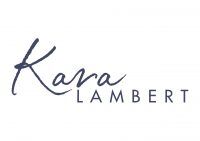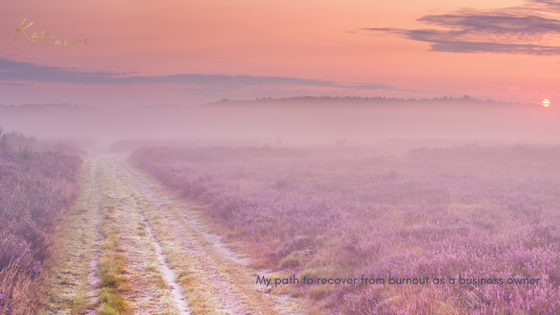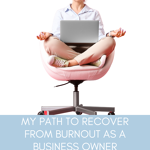It’s June 2022 and I’m now 12 months down my path as I recover from burn out. I wanted to record what I’ve done so far that has helped my recovery, mostly to help you and partially to remind me. I don’t want to go back there.
Coming into the first weekend of June 2021, I had had a blood test to try and work out why I was so out of breath. I couldn’t walk to the end of our driveway without feeling exhausted. I had been baking for our son’s 14th birthday that weekend, where we planned to have family join us for afternoon tea and for him to have some mates stay over. It was his first birthday in our new home and I wanted it to be special. I had been planning and baking and shopping up a storm.
I woke up Saturday morning and I broke into tears. I was exhausted. I was inconsolable. I tried to get up to get things ready for that afternoon and I just couldn’t. My husband, with an incredibly concerned look on his face, tucked me back into bed and I collapsed back to sleep.
For the next two days, I woke periodically only to burst into tears and fall back asleep. Thankfully we were in the throes of covid and we were able to quickly call the party off saying I was unwell. A friend collected my son to go and stay with his best friend, their son, overnight. My husband kept checking in on me.
I took the following week off work and alternated between being in bed or on the couch. I saw my GP for the test results. I told him what had happened, and while I had mild iron anaemia, he agreed I had burnt out. I had an appointment with my psychologist and she agreed I had burnt out and together we planned my path to recover from burnout.
Pretty ironic considering only one month earlier I had written an article on how to avoid burnout.
So 12 months on, what have I done to recover from burn out? What have I learnt?
Learning to recover from burnout by knowing the triggers.
Looking back, some of these lessons have taken far too long to learn and others I so ingrained that I have to regularly remind myself that the old behaviour no longer serves me. Here are the things I had to change to recover from burnout:
Not prioritizing myself
Not asking for help
Not setting boundaries
Having unrealistic expectations
While I understand that we are all different, there are some consistencies I’ve found with the research available on burnout. Many people who burnout have unrealistic expectations and struggle to ask for help. Incidentally, these are some of the key traits of Type A personality and Imposter Syndrome.
Boundaries and recovery from burnout
I’ve been good with work boundaries for a few years now. No work email on my phone. No work at night. Restricted work on Sunday afternoon, when it suits what we’re doing as a family.
But that last word is where my boundaries failed – family. I will do anything for my family and for my friends. To my detriment.
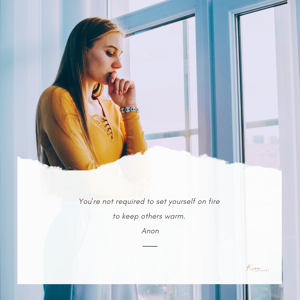
Burning out, starting to recover, and then going through family breakdown, serious family illness, and then covid – I had to learn to put in and hold boundaries. I was negotiating too much of myself away to the needs of others. There was nothing left for or of me.
I’d like to say that I started small. What I started with was non-negotiables. They can be hard, especially when it comes to family. I had
to remind myself that there was more at play than what was in front of me and more to lose if I didn’t hold my boundary.
Holding boundaries required me to be vigilant with myself and what made me hold the boundary from the outset:
– a non-negotiable
– a value
– the bigger picture.
I have moved on from holding boundaries with friends and family, thankfully the ones who disrespected my boundaries moved on. That’s the benefit of holding boundaries. The people who really matter respect them. It doesn’t mean that it doesn’t hurt, and I’m still hurting. It just means that the bigger picture is still more important and I remind myself of that – especially when I hear laughter in our family.
I am beginning to hold boundaries with myself, however, I am metering it with tapping into my intuition. M
y health is what started this journey to recovery from burnout and it’s only fitting that it bookend it.
What I can recommend is to understand those three keys for you and to start. Start small if you want to, start big if you need to. Understand that the boundary you hold is important for your welfare, well-being, or benefit. Understand that it may be hard and you may face push back, in the end it will be worth it.
Asking for help in my recovery from burnout
Part of my Type-A personality is a need for control. I acknowledge that. As a parent, it’s kept my family safe and functional. However now we have teenagers, I have to learn to pass that control on to them.
It’s funny that I took a break from writing this and went for a walk to clear my mind. As I started, I saw my neighbour and asked her for some gardening advice, she has a stunning garden and we are just establishing ours. She offered me some plants and I declined. My type-A kicked in and I needed to control and follow through what I had planned. What I realised on my walk is that I had asked for help and someone had offered me more than I was prepared to receive. I have gone back and accepted her beautiful offer and apologised for letting my pride get in the way.
In my recovery from burnout, I caught covid. In quarantine, I had to learn to ask for precisely what I want
ed and not just what I needed. I was always delighted when hubby and the kids went that little bit further. This was the first step in my journey, being put in a position where I had to ask for what I needed and wanted and rely on someone else to meet it.
The thing with asking for help is being open to the possibility that what you asked for will not be met, sometimes that means that it will be exceeded. When you’ve been brought up to be the giver, receiving can be hard and receiving more than you expected harder still.
Part of this journey in my recovery from burnout has been passing control of my needs to others, now it’s about realising that others (like myself) get joy from exceeding expectations and helping others. Sometimes the “others” will be me.
Expectations and my recovery from burnout
I hold myself to a high standard. I expect a lot. In the first few weeks after I burnt out, I had to learn to be ok with not meeting the expectations. As 2022 started and my life became incredibly complicated, I had to be ok with lowering my expectations of what I could achieve.
I have used bullet journaling for years. It helps me with my time management. The issue is that it lays open what I need and want to achieve. Then add in time management “rules” that if something is carried over for a third time, it needs to be handled differently and my expectations of what I am doing come under question (by me and my expectations).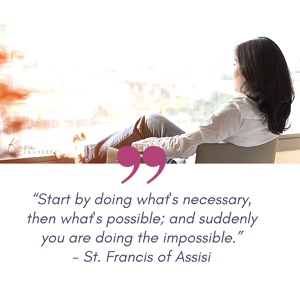
Honestly, I’ve tried to be gentle with myself. It was easier when I was unwell and physically unable to do much. As time progressed, I became frustrated that I wasn’t where I thought I should be. Again, my expectations had kicked in.
I’ve also tried talking to myself like I would a friend or client. It didn’t work because my mindset stopped me from believing it. My expectations are such a deep part of the story I play myself that I needed to either unpack them or try another way.
I am currently leaning into my intuition. I am being more objective when responding to my thoughts (I asked my neighb
our for some of her plants she offered). Instead of questioning the story, I’m actively reprogramming it. It’s taking work, but I know that the benefits will outweigh the work I have to go through.
Our expectations served us in the past. Perhaps they protected us, spared us the pain of disappointment, or ensured that we received the attention we craved. Adjusting expectations does not equate to not coping or failing. Adjusting expectations is a way to set boundaries, with ourselves, that challenge our beliefs, our ‘shoulds’, comparisons, and stories that no longer serve.
Prioritising myself and my recovery from burnout
This has been the hardest one. And over the years, I’ve repeatedly told myself (and others) that “you can’t pour from an empty cup” and “you need to put your oxygen mask on first”. I became the classic of knowing what I needed to do but not having the right mindset to do it.
Prioritising myself as I recover from burnout has had to occur on a number of fronts. In fact, I’ve needed to put in boundaries, challenge my expectations, ask for help all to prioritise myself. Some may also realise that by doing these things, I have prioritised myself – and I have.
I have also put my needs first. I started to do gentle stretching to help with ongoing pain, first thing in the morning, rather than starting to do the day’s tasks.
I have been proactive about my health and taking a preventative approach to my healthcare.
Most importantly, I have been prioritising my intuition and listening and behaving in alignment with wh
at I intuit. Of all the things, this has been one of the greater challenges to my recovery from burnout. I need to listen to my heart, my body, my mind. I need to be objective to what I intuit. I need to trust it. Then I need to action it. It’s a lot and it’s confronting. I’ve not always felt that I’ve had that sovereignty, especially since becoming a parent. The story I have told myself has not been full of self-trust, more like self-judgement. Listening has generally been accompanied by self-criticism. I’ve been fortunate that I have not been too troubled by guilt. The recovery of burn out in the early days has shown me that there is no place for guilt in this. I need to take care of me, primarily. While some will be there to pick up the pieces, I need to be the architect and builder of how they go back together.
A final word about recovering from burn out
If you are recovering from burnout, I encourage you to:
– seek professional help to investigate underlying medical and/or psychological causes or contributors
– give yourself time, as much time as it takes, you will feel when you’re improving
– be gentle with yourself and firm with your boundaries (they protect you)
– trust yourself, you will improve with time, patience, and healing.
I hope this post has helped you, either in your own path to recover from burnout, or to prevent burnout. If you’d like to talk further about it, please book a chat time using the link below.
